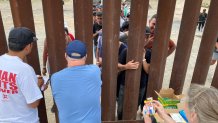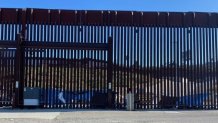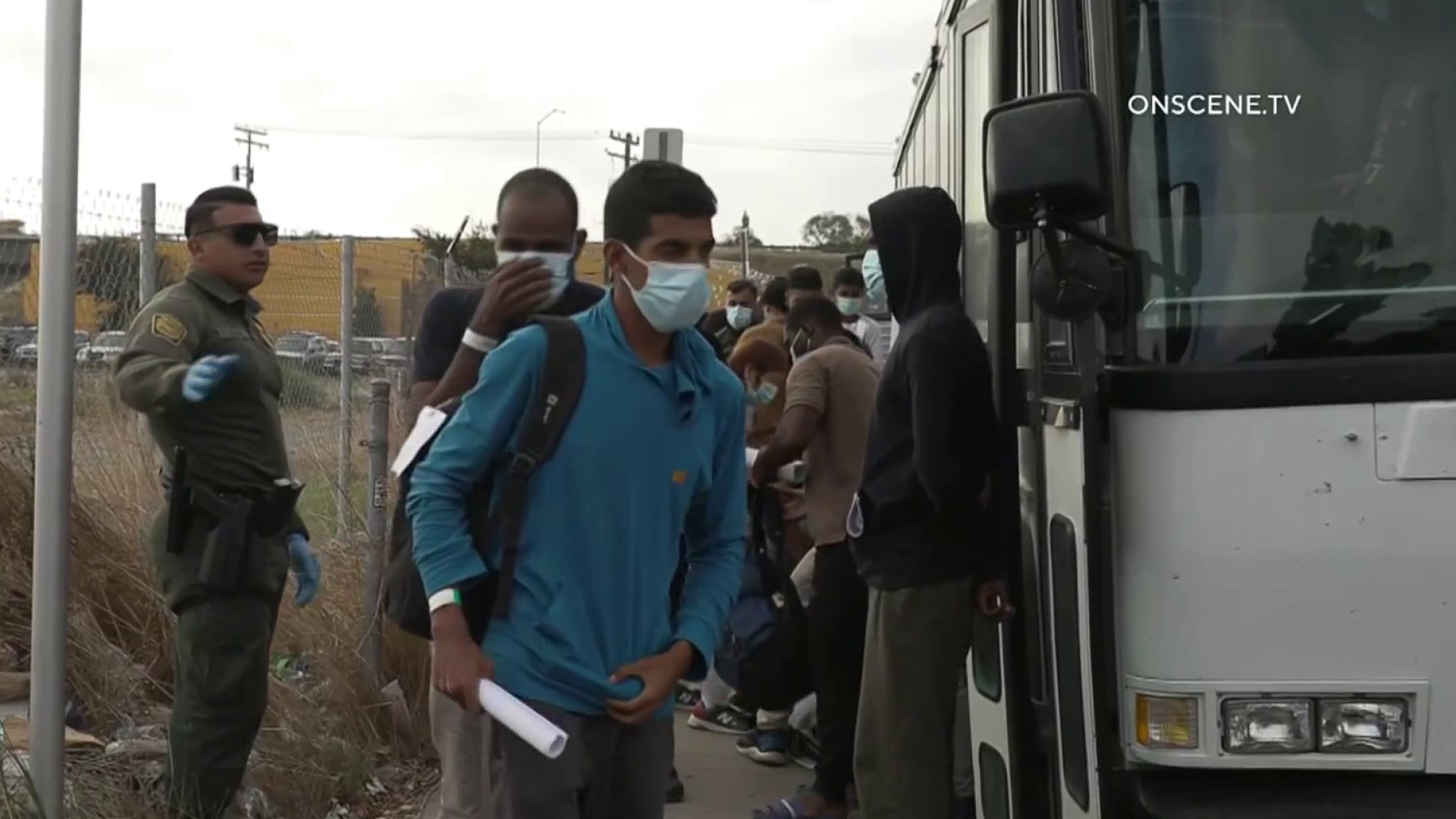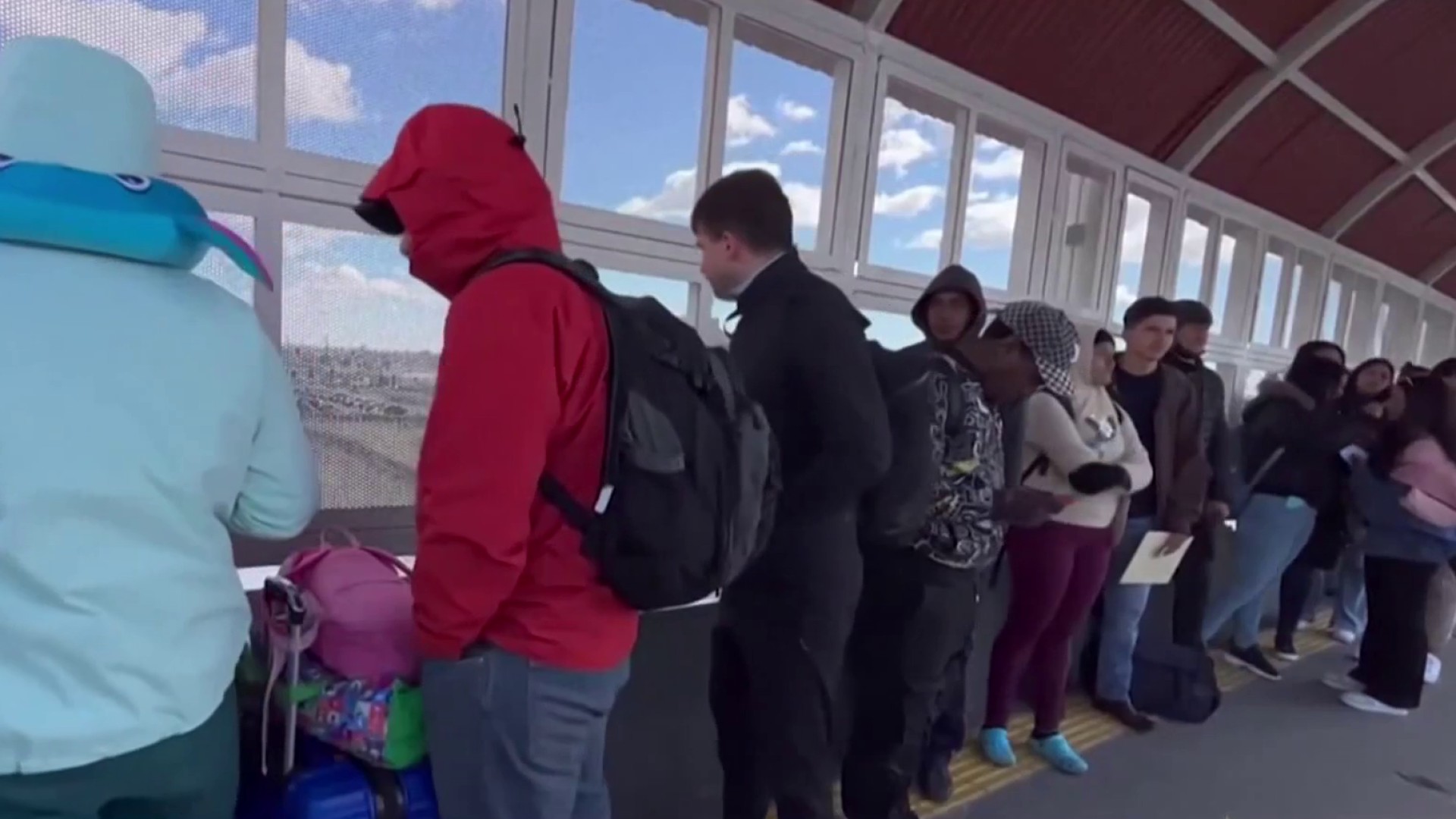Close to 700 migrants fleeing countries from across the globe were camped in between boundary fences at the U.S.-Mexico border this week in an attempt to start the asylum process with U.S. border officials.
The situation forced the closure of the Pedestrian West border crossing in San Ysidro on Thursday to free up U.S. Customs and Border Protection agents to help Border Patrol process migrants for asylum.
Aisha, from West Africa, arrived at the border Tuesday night with 20 other travelers. The wife and mother said she is fleeing the violence in her own home. "My husband beats anytime," she said.“I want to make my life better.”

Get top local stories in San Diego delivered to you every morning. Sign up for NBC San Diego's News Headlines newsletter.
Conditions were primitive at this location, which is not an official CBP holding area but rather a place where migrants have gathered awaiting officers to take them into custody for the asylum process. Trash is piled in the center of the encampment. Tents made of paint tarps and mylar thermal blankets dot the fence line.
By Thursday afternoon, the border showed a starkly different story than the day prior. The area between two border fences in San Ysidro was nearly empty with just hints of the group that was previously there -- discarded thermal blankets, crumpled food wrappers and some personal items that got left behind.
It was not immediately clear where the group went but Border Patrol agents were leveraging all available resources to apprehend, transport, screen and process migrants as expeditiously and safely as possible.
“As such, our USBP agents leverage all available resources to apprehend, transport, screen, and process migrants as expeditiously and safely as possible, the spokesperson said in a statement.

“USBP recognizes at-risk populations may require additional care or oversight and prioritizes the transportation and processing of these migrants. Such at-risk individuals, including families and children, are brought to Border Patrol facilities where they can receive medical care, food, and water.
“We remain vigilant and expect to see fluctuations in irregular migration -- knowing that smugglers continue to use disinformation to prey on vulnerable individuals. We are working to address the flow of migration while safeguarding the wellbeing of migrants in our custody.”
On Wednesday, dozens of migrants were dropped off at transit stations in San Diego County on Wednesday morning. It is unclear when those people began their asylum process, but CBP said releasing them in the U.S. while they wait to be processed is standard procedure. They drop them off near public transit to make it easier for them to get to where they're going next.
NBC 7 has not yet confirmed if the group spotted as late as Wednesday evening had the same fate but San Diego County Supervisor Jim Desmond said the federal goverment told him as many as 500 migrants were expected to be dropped off at transit stations.
"The Federal Government is failing in its obligation to protect the people of San Diego County," Desmond said in a written statement, in part. "This system is broken and puts our region at risk. If the Federal Government wants to process asylum seekers, it must provide adequate resources to manage people entering our area."
CBP statistics indicate that from June to July there was a 30% increase in migrant encounters between ports of entry. That is still less than a year ago when the Title 42 health order was in effect.
Related Stories
On Wednesday, women, children and men gathered in the same spot, until Border Patrol agents separated the men for reasons of safety.
“Complaints of creepy stuff going on, we don’t want that. It’s the safety of women and children," an agent said through the slotted 30-foot fence to a volunteer in the U.S. handing out toiletries and food.
The situation at the border was reminiscent of the final days of Title 42. A robust volunteer effort by human rights activists features separate stations for cell phone charging, donated clothing, first aid, toiletries and food.
Among the volunteers was UC San Diego graduate student Yingjie Fei."I just charge their phones and give them back," she said describing her duties. "I love to help people."
It seems that the migrants' basic needs are being met.
"I feel good here because American people care about me. We’re not hungry, we have eats [sic]," said a woman who wished to be identified as Georgian citizen. She said she's there because things are bad in Eastern Europe. "We come because we have big problem in country. We are hungry, we have little money, a difficult life there."

Adriana Jasso, an activist with the Friends Committee in San Diego, said the group gathering at the border is more diverse than ones seen in previous asylum-seeking influxes, when many migrants were coming from Central and South American countries.
CBP blames aggressive human smugglers for the increase of migrants collecting at the border. Immigration advocates say asylum seekers are having trouble with or don’t even know about the CBP1 app they need to use to get an appointment for processing.
What migrants there do have is hope. There is, after all, great joy in making it this far.
“I love you America, I love you America," Aisha rejoiced. "Just now I am talking to my sister and say American people is the best, the best."
In part of a statement, a CBP spokesperson told NBC 7 human smuggling organizations are moving migrants through the enforcement zone in the San Diego area.
On the Tijuana side of the border, the situation is more of the same -- migrants awaiting their shot at a better life.
"The salary is very minimal, miserable, a salary is only for a carton of eggs, it is a monthly salary and the majority of people there get used to what is given, but one does not get used to that,” commented a migrant who He identified himself only as Giancarlo and said he came from Venezuela.
For others, distance becomes torture, especially when their loved ones are left far away, although they say they do not lose hope of fulfilling the American dream. Such is the case of Sergio, who also said he came from Venezuela.
“Imagine your birthday is in three days and I'm here, I've already been out of my country for three months, and on September 16 my daughter is going to turn 5 years old, I'm here without having the opportunity to send money, a birthday letter. "The most it will be is a call, but I think it is very difficult."
Enrique Lucero Vázquez, municipal director of migrant care in Tijuana has some ideas of why the influx at the border occurs. For one, it can be attributed to the desperation of some migrants when they cannot get an appointment through the CBP One app, which is reportedly problematic and overwhelmed with demand, he said. It is also likely due to a network of traffickers who he says advertise on TikTok or Facebook “as if they were travel agencies.”



